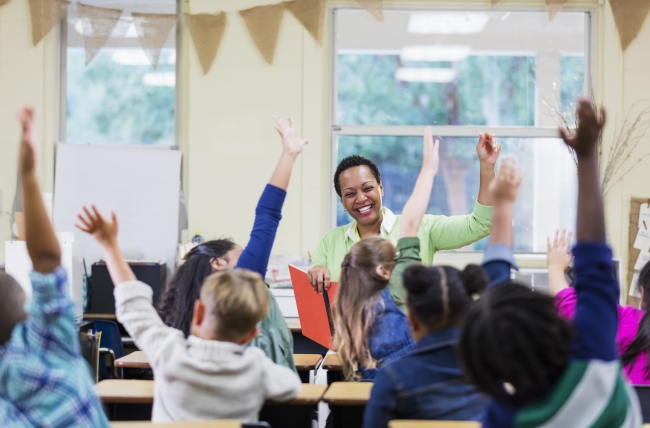You have /5 articles left.
Sign up for a free account or log in.

The Academy for Rising Educators at Seattle Central College provides adult learners working in Seattle Public Schools the opportunity to get credentialed as teachers, addressing a lack of teachers of color in Washington State.
kali9/E+/Getty Images
To address the need for more diverse teachers and promote representation among educators in the Seattle public school system, administrators at Seattle Central College created a pipeline program for locals already working in the district.
The Academy of Rising Educators (ARE) at Seattle Central, part of the Seattle Colleges system, supports around two dozen adult learners interested in earning their teaching credential. With a focus on relationship building and antiracist pedagogy, the program produces teachers focused on student success.
What’s the need: Despite a majority of students in Seattle schools belonging to a historically marginalized ethnic or racial group, there has been a lack of equal representation among their teachers.
In the 2022–23 academic year, 55 percent of students in Seattle Public Schools were nonwhite, but 79 percent of teachers were white, according to data from the Washington Office of Superintendent of Public Instruction.
More specifically, around 14 percent of students were Hispanic or Latino, but only 4.5 percent of teachers belonged to the same race or ethnicity. Similarly, around 14 percent of students are Black or African American, but only 5.6 percent of teachers in the district are Black.
Additionally, Seattle public schools have a history of disproportionate outcomes for Black students, specifically, and research shows the value of Black teachers for Black student success, and for male students especially.
“Washington just hit a tipping point a couple of years ago; we have more students of color throughout the state than we had teachers of color. It’s very skewed,” says Pat Russell, executive dean at Seattle Central and one of the program creators. “Things like that will tell you what you need to do and then ask, why?”
How it works: When the program launched in 2018, Seattle Central administrators imagined it would be a pipeline for traditional-aged students taking advantage of the Seattle Promise scholarship, which offers free tuition at any of the Seattle Colleges for two years, 90 credits or a student’s first degree, whichever comes first.
In actuality, the largest share of applicants were adult learners, many of them already working in public schools as para-educators, instructional assistants or similar roles who wanted to earn their credentials.
To accommodate these learners, Seattle Central reimagined the times and modalities in which courses were offered, allowing for evening classes and online learning.
Applicants apply each January for the upcoming academic year and are admitted into a cohort of 25 to 30 students.
The program is still 100 percent tuition-free, and students are also provided laptops, hotspots and notebooks, as needed. Personalized advising, counseling and support services, such as childcare, are available through the college as well.
After completing their associate of arts degree in education and social justice, students can transfer to the University of Washington, North Seattle College, City University or Central Washington University to complete their bachelor’s degree. Many continue their degree in a completely online modality.
What’s different: The curriculum focuses on intergenerational trauma and academic trauma for students of color in school systems and how to promote healing.
“We don’t want to say, ‘Everyone’s experiencing trauma,’” says Russell. “We want to acknowledge that people have had a lot of different experiences, those experiences have made people who they are and they’re very legitimate experiences, and we begin to lean into those experiences for our students and validate them academically—to us, that’s the healing piece of it.”
The program also has a group of specially selected adjunct faculty members who are dedicated to teaching, which helps build a sense of community and family among participants and personnel, says Daudi Abe, ARE’s faculty coordinator.
“Being able to build a teaching academy from the group up, this feels like what I was, at least in part, what I was put here to do,” Abe says. “I don’t think that you can replicate— You certainly can’t fake that kind of enthusiasm, that kind of care, that kind of love.”
“Family” is a commonly used phrase among participants and faculty members, as the program is not just academically focused but designed to support students as they work toward their goals, no matter what those barriers may be, Abe says. “The structure of the program, the vernacular around the program and the manner in which we bring in instructors is all very intentional.”
What’s next: Since launching, the program has supported five cohorts, two still in classes. ARE staff have coordinated celebrations that unify program participants across cohorts, providing opportunities for networking and relationship-building.
“Cohort One is legendary, because they’re Cohort One, and seeing some of the members of the young cohorts look up at them and being like, ‘Wow, that’s where we’re shooting to be, that’s where we’re trying to be one day,’” Abe says. The events also provide a natural forum for mentorship, allowing students to learn from one another.
The program is expanding, working outside of Seattle public schools and turning attention to neighboring King County cities as well as the Puget Sound Education Service District.
Program leaders also see a need for more community engagement and promotion of the program, tabling at events and highlighting the benefits to local groups.
Get more content like this directly to your inbox every weekday morning. Subscribe here.




